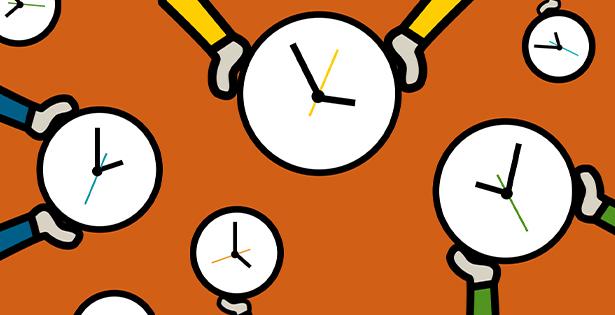Time is precious

Dawna Ballard studies time and how humans are bound to it. Her research dives into what motivates and drives people and the pace of their lives.
Ballard, an associate professor in Moody College’s Department of Communication Studies, shares insight, analysis and advice for how to better understand the utility of time and how to experience time as our society is striving for global health and well-being.
Time is an event.
The experience of time now feels so surreal. We don’t know what day of the week it is. Everything is floating together.
This is actually helping us to understand what time really is.
We’re not responding to clocks right now. What does a clock mean, what real utility does it have? Clocks distinguish clear, controllable, finite certainty, and that is not what we’re experiencing right now.
We’re responding to the life cycle of a virus. We’re responding to flatten the curve. These are all things that are dynamic.
The trick for us is to take on a new understanding of time.
Time is an event, and we respond to the event before us and then make choices based on how events are unfolding.
Time is a season.
We have to focus on the natural cycles of time.
In agrarian societies, you work when you need to work, and you then rest when you don’t need to work. You always listen to what time is telling you – that’s the gold model of the agrarian approach to time.
We have so many other clocks in our day that compete with our natural clock, and we have developed a difficulty figuring out how to be true to it, because we’re baked into the idea that time is scarce.
It’s rooted in our basic evolutionary drive toward fight or flight, toward having threats in the environment. We don’t have to contend with bears and wild animals to stay alive, but that’s how we are designed. So we still scan the environment and look for threats to conquer. In the industrial culture, it’s the clock. That is the threat.
Fear changes our rhythms. It can actually mess with our internal clocks. If you can manage fear, you can figure out that natural rhythm, how to listen to it and how to maintain it.
Time is a decision.
In clock-based cultures, time is driven by tasks, but in event-based cultures, time is driven by relationships.
In COVID-19, we finally have a threat that is not time-based. It’s not a clock. It’s a biological threat, so we have responded just as you would imagine – we’re shifting, we’re doing the things that fight the real threat. Time is falling by the wayside.
I do believe one of the opportunities in this moment, when the decisions we make have significant consequences, is to clarify what matters most. We take our careers seriously, we take our schoolwork seriously, but it’s not that serious. It’s not more serious than our lives and the lives of others.
I think this is something to hold on to and use that same logic when operating in different parts of your life.
Where do you want to be at the end of your life? Important relational goals are going to be something that you want to have achieved.
Time is just a metric because we agree to it. It’s a decision that we can make, and we can make different choices.
